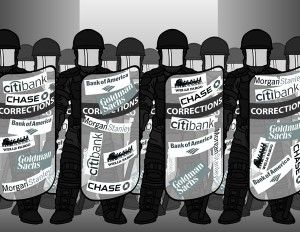
Protest is a healthy form of political expression, and when it’s grounded in solid principle, it can bring about positive change. Unfortunately, this is not the case when it comes to the Occupy Wall Street protests.
An attitude of general hatred toward the top earners in our society permeates the messages of Occupy protesters. This doesn’t help us for several reasons. One is that many of the top earners in our society are not crooks, but rather innovators and entrepreneurs that hire people and produce wealth, which ultimately is what helps economies recover. Many of them don’t live on Wall Street either and aren’t even remotely involved in finance or banking. And yet the “1 percent,” if we define them as anyone in the top 1 percent of earners in America, includes these businessmen. Steve Jobs was certainly in the 1 percent. His company is worth hundreds of billions, but he created thousands of jobs. Furthermore, Apple technology makes most of our lives better in some form or another, and is used in countless industries and businesses that help the economy. It’s innovations from companies like Apple that will improve our standard of living in the future, and if the people that run that company make more money than 99 percent of the population, then more power to them. Steve Jobs didn’t take anyone’s money, but he was in the 1 percent and, as such, must be considered an enemy of the 99 percent.
Furthermore, 99 percenters are keen on the belief that taxing the rich is the solution to our economic problems. But this is easy to dismiss. Economies don’t struggle because of income inequality, but because of problems in speculation and production. Taxing the wealthy and putting revenue in the government’s hands will do little to help the economy, because governments can’t solve these problems with fiscal stimulus. It’s been tried and failed because governments typically do a bad job when it comes to investing and spending, not to mention there are some markets that simply need to fail for the economy to recover. The government slows this process down by picking and choosing certain industries and groups to support. The market will create the wealth that can get us out of our recession; aggressive fiscal spending will not.
The 99 percent message is also bad for America’s political climate. Fighting for policy that blatantly picks out a group and punishes them is setting a bad precedent, and it can create situations where the government is ruled by a “tyranny of the majority.” The attitude that pits one set of classes against another has led to an immense number of injustices, notably the development of fascism in the 1920s, the Reign of Terror, and numerous Communist revolutions in the 20th century.
Our country has a serious problem, which involves the mixing of the interests of private corporations with public institutions, particularly in our financial systems. Occupiers realize this problem, but they point the finger at the wrong culprit. In economics, we learn that the market responds to incentives. Banks have been given incentives to over-speculate in markets for years because of artificially low interest rates set by the Federal Reserve and because of generally misguided policies in Congress. Regardless of their intentions, if Congress did not have the authority to react to bad decisions made by banks and bail them out, then perhaps we need to ask ourselves if banks would make as many bad decisions in the first place. Occupiers argue that deregulation caused the financial crisis. However, given incentives to lend as they did, I wonder what regulation would have slowed down lending, particularly when there are plenty of bills that encourage banks to overlend, even when the market says to retract borrowing and lending.
Occupy Wall Street participants seem to be adamant that people who work on Wall Street are responsible for their problems. One particular complaint that never ceases to appear are cases of struggling twenty-somethings with loads of student debt. How exactly are banks to blame for student loan problems? Banks have little, if anything at all, to do with the cost of tuition, and they only lend out money that people ask and sign for. Organizers at Occupy must realize this: They aren’t stupid. But they embrace the fact that some people are struggling more than others and use that as fuel to bring about political change, even if their complaints don’t justify the political action they support. This may result in misguided policy that could very well make the 99 percent worse off in the near future.

